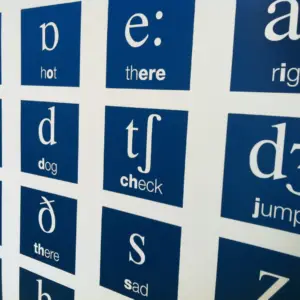What is the International Phonetic Alphabet and How Can It Help with English Pronunciation?
The International Phonetic Alphabet (IPA) sets the global standard for pronunciation. Designed by British and French linguists of the International Phonetic Association in 1886, and continually revised to adhere to contemporary phonetic theory, the IPA assembles a standardized set of symbols, each breaking down and defining the pronunciation of various sounds present in spoken languages across the globe.
Join the British Accent Newsletter
Let’s learn about British pronunciation!
What is the International Phonetic Alphabet?
The IPA is the result of the scientific study of phonetics; a chart compiling Latinized letters and punctuation representing the sounds found within human speech, in any and all languages and accents.
The IPA’s coded language substitutes the letters of any particular word for various symbols representing each sound within that word. For example, the English word ‘flat’ is pronounced /flæt/ – which can be broken down into the IPA’s phonetic symbols, “f”, “l”, “æ” and “t.” The word ‘shop’ can likewise be spelled as /ʃɒp/ – using the phonetic letters, “ʃ,” “ɒ” and “p.” By learning the correct pronunciation of these letters, we can string their sounds together to form any word in any world language

As a result, the IPA’s standard of phonetic pronunciation can be implemented by second-language learners, regardless of what their native language is, or which new language they are picking up.
Understanding the correct expression of pulmonic consonants and vowels accounts for the most important aspects of learning English pronunciation. But, as a world resource, the IPA also includes symbols representing sounds mostly unheard in the English language, such as clicks (e.g. “ʘ”) and ejectives (e.g. “p’”), alongside other unworded sounds like glottal stops, as found in the pause between ‘uh–oh’, for example.
Using the Phonetic Alphabet to Improve Your English Pronunciation
The IPA is an established pronunciation tool for native and non-native English speakers alike, its array of symbols offering multiple insights into how to accurately speak any new word.
Here are just some of the ways the IPA can help guide your understanding in using the correct English pronunciations:
Different Sound, Same Spelling
While dismantling confusion between words that sound the same but are spelled differently, the IPA also assists in defining words and letters which sound different but are spelled the same.
The IPA discerns these contrasting pronunciations of identically written letters (such as the “c” in “cat” and “spice”) by representing them with different symbols. For example, while “goose” and “foot,” in writing, share the same vowel sound, “oo,” their pronunciation is distinct from each other. The IPA accounts for this in its pronunciation standard, issuing the symbol “u” to the “oo” sound of “goose,” and “ʊ” to “oo” of “foot.”
Finding Silent Letters
By referring to a word’s phonetic spelling in an English dictionary, we can discover any potential silent letters within that word (letters which are written but not said aloud). For example, the word “pneumonia” clearly drops the silent “p” in its IPA spelling — /njuːˈməʊ.ni.ə/ — beginning instead on the sound “n” and indicating that the ‘p’ isn’t actually expressed.
Pronunciation Placement
The official IPA chart describes from where in the throat or mouth each phonetic letter is sounded, including letters that are pronounced using the tongue and teeth (such as ð, the IPA symbol for “th”), sounds made by closing both lips, such as in “m” (“mom”) or “b” (“baby”), as well as sounds which are spoken fricatively, nasally and so forth. Alongside identifying which syllables emphasis is correctly placed on, the IPA also uses accents to standardize where tone and contour is found within a word.
Learning to Speak in an English Accent
The IPA’s interpretation of English words offers a perfect advantage when aligning your accent closer to a true native sound. While dictionaries including phonetic IPA spellings may include American and British (RP) English pronunciations, alternative IPA spellings can aid one in learning to speak in regional English accents such as Cockney or Scottish.
Native English speakers can also gain aid from the IPA’s phonetic language. Whilst improving the precision of false accents amongst voice actors, the IPA can help one understand the correct pronunciations of complex, technical or scientific terms, as well as indicating the proper pronunciation of foreign places and names.
Learn IPA in Your Native Language
IPA’s standardized symbolism offers the benefit of learning and practicing the phonetic language using native words, before transferring your skills to pronouncing non-native words. If you can learn to understand and speak words from your own native language using the IPA spelling alone, you’ll soon be able to pronounce any given international word with ease, bypassing the peculiar inconsistencies found between spoken and written English.
Other Posts

Chris Pratt and the Essex Accent
Chris Pratt and the Essex Accent Hollywood actors have a unique talent to tell a story through their character’s eyes, using body language, facial expressions,

What is IPA (International Phonetical Alphabet)
What is the International Phonetic Alphabet and How Can It Help with English Pronunciation? The International Phonetic Alphabet (IPA) sets the global standard for pronunciation.
How do Homophones, Homographs and Homonyms Affect Pronunciation?
What Are Homophones, Homographs and Homonyms and How Do They Affect Pronunciation? Homophones, homographs and homonyms form a vital part of English grammar. Words which

Difficult Pronunciation: Bitch vs Beach
Can You Tell the Difference Between Bitch and Beach? Many students around the world struggle with these 2 common words. Today we are here to

7 Celebrities Who Speak With Cockney Accents
7 Celebrities Who Speak With Cockney Accents As a multi-cultural capital city, London accents are as varied as its people. If you’re learning English and

Scottish TV Shows to Help English Learners Improve Their Listening Skills
Scottish TV Shows to Help Your Listening Skills Understanding regional British accents isn’t always easy. With so many diverse pronunciations and localised phrases, even some